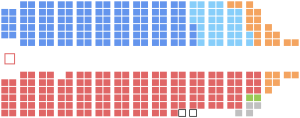
Back مجلس العموم الكندي Arabic مجلس عموم كندا ARZ Палата абшчын Канады Byelorussian Cambra dels Comuns del Canadà Catalan Kanadská Dolní sněmovna Czech Tŷ'r Cyffredin (Canada) Welsh Underhuset (Canada) Danish Unterhaus (Kanada) German Βουλή των Κοινοτήτων του Καναδά Greek Ĉambro de Deputitoj de Kanado Esperanto
House of Commons of Canada Chambre des communes du Canada | |
|---|---|
| 44th Parliament | |
 | |
| Type | |
| Type | of the Parliament of Canada |
| History | |
| Founded | 1867 |
| Leadership | |
Justin Trudeau, Liberal since November 4, 2015 | |
Karina Gould, Liberal since July 26, 2023 | |
Andrew Scheer, Conservative since September 13, 2022 | |
| Structure | |
| Seats | 338 |
 | |
Political groups | His Majesty's Government
His Majesty's Loyal Opposition
Parties without official status
|
| Salary | CA$194,600 (sessional indemnity effective March 31, 2023)[2] |
| Elections | |
| First-past-the-post | |
First election | August 7 – September 20, 1867 |
Last election | September 20, 2021[3] |
Next election | 45th Canadian federal election |
| Meeting place | |
 | |
| House of Commons Chamber West Block - Parliament Hill Ottawa, Ontario Canada | |
| Website | |
| www | |
| Constitution | |
| Constitution Act, 1867 | |
| Rules | |
| Standing Orders of the House of Commons (English, French) | |
The House of Commons of Canada (French: Chambre des communes du Canada) is the lower house of the Parliament of Canada. Together with the Crown and the Senate of Canada, they comprise the bicameral legislature of Canada.
The House of Commons is a democratically elected body whose members are known as members of Parliament (MPs). There have been up to 338 MPs since the most recent electoral district redistribution for the 2015 federal election, which saw the addition of 30 seats.[4][5][6][7] Members are elected by simple plurality ("first-past-the-post" system) in each of the country's electoral districts, which are colloquially known as ridings.[8] MPs may hold office until Parliament is dissolved and serve for constitutionally limited terms of up to five years after an election. Historically, however, terms have ended before their expiry and the sitting government has typically dissolved parliament within four years of an election according to a long-standing convention. In any case, an act of Parliament now limits each term to four years. Seats in the House of Commons are distributed roughly in proportion to the population of each province and territory. However, some ridings are more populous than others, and the Canadian constitution contains provisions regarding provincial representation. As a result, there is some interprovincial and regional malapportionment relative to the population.
The British North America Act 1867 (now called the Constitution Act, 1867) created the House of Commons, modelling it on the British House of Commons. The lower of the two houses making up the parliament, the House of Commons, in practice holds far more power than the upper house, the Senate. Although the approval of both chambers is necessary for legislation to become law, the Senate only occasionally amends bills passed by the House of Commons and rarely rejects them. Moreover, the Cabinet is responsible primarily to the House of Commons. The government stays in office only so long as they retain the support, or "confidence", of the lower house.
The House of Commons meets in a temporary chamber in the West Block of the parliament buildings on Parliament Hill in Ottawa, while the Centre Block, which houses the traditional Commons chamber, undergoes renovation.
- ^ "Liberals, NDP agree to confidence deal seeing Trudeau government maintain power until 2025". CTV News. March 22, 2022. Archived from the original on March 22, 2022. Retrieved March 22, 2022.
- ^ "Indemnities, Salaries and Allowances". Parlinfo. Parliament of Canada. Archived from the original on July 12, 2018. Retrieved October 12, 2021.
- ^ "Trudeau calls federal election, voters to go to the polls Sept. 20". August 15, 2021. Archived from the original on August 15, 2021. Retrieved August 15, 2021.
- ^ Guide to the Canadian House of Commons (PDF). House of Commons of Canada. 2009. ISBN 978-0-662-68678-1. Archived from the original (PDF) on December 20, 2013. Retrieved September 29, 2007.
{{cite book}}:|work=ignored (help) - ^ "Members of the House of Commons – Current List – By Name". Parliament of Canada. Government of Canada. Archived from the original on September 25, 2007. Retrieved September 25, 2007.
- ^ "Members of Parliament". Parliament of Canada. Government of Canada. Archived from the original on April 24, 2011. Retrieved September 25, 2007.
- ^ Thandi Fletcher (December 16, 2011). "Crowded House: Parliament gets cozier as 30 seats added". Canada.com. Postmedia News. Archived from the original on March 14, 2013. Retrieved December 19, 2011.
- ^ "Elections Canada On-Line". Electoral Insight. November 21, 2006. Archived from the original on March 8, 2008. Retrieved September 29, 2007.
© MMXXIII Rich X Search. We shall prevail. All rights reserved. Rich X Search